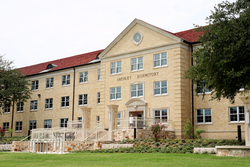Sherley Hall renovation awarded LEED® Gold Certification
 |
Fort Worth, TX
7/31/2009
TCU has been notified that the recent renovation of an existing residence hall from the 1950s has received LEED Gold Certification level status from the United States Green Building Council’s Leadership in Energy and Environmental Design (LEED®) rating scale. Sherley Hall is the first building on campus to achieve LEED certification and underscores the university’s long-term commitment to sustainability.
As part of TCU’s ongoing efforts to transform its campus with each building project, this renovation of an existing building provides 76,403 sq. ft. for 162 double-occupancy sleeping rooms, community living areas, study lounges, laundry facilities and theater and video gaming rooms. The renovation was designed by KSQ Architects and built by The Beck Group, whose sustainability division also provided LEED® consulting services.
Some of the project highlights:
• The building employs a number of integrated strategies to reduce its energy usage while providing for greater comfort levels for its occupants:
• A 41 percent energy reduction was achieved for interior lighting, and 53 percent for exterior lighting
• Energy consumption for heating is estimated to be reduced by 34 percent, resulting in over 18 percent cost savings per year
• Energy consumption for cooling is estimated to be reduced by 40 percent, resulting in over 16 percent costs savings per year
• Energy Star appliances in each dormitory room will save 31 percent over non-Energy Star appliances
• The building’s thermal control systems were designed to meet higher human comfort standards by integrated control of air temperature, flow rate, and humidity and by providing higher levels of outdoor air. The effectiveness of the system will be tested with occupant surveys and adjusted.
• All rooms provide occupants with ample daylight and views, both of which have been proven to increase productivity and well-being.
• Occupants have also been given individual control over lighting and thermal comfort, further enhancing their comfort and well-being.
• Water usage has been reduced by more than 37 percent through the installation of dual flush toilets and ultra low flow lavatories and showers.
• Re-use of over 98 percent of the original building and diversion of 92.5 percent (1,285 tons) of the construction waste from landfills mitigated the detrimental effects of new construction while preserving cultural resources.
• More than 20 percent of the materials selected for the project include products with high-recycled content and those which were local or regionally manufactured.
• Indoor air quality was assured with a stringent Indoor Air Quality Management Plan during construction and installation of products with Low Volatile Organic Compound (VOC) content levels and which were formaldehyde-free. Building maintenance plans include requirements for Green Seal Certified cleaning materials and non-toxic pest control.
• The long-standing campus commitment to recycling extends into dormitory life with recycling rooms on every floor for paper, plastic, aluminum, glass and cardboard items.










